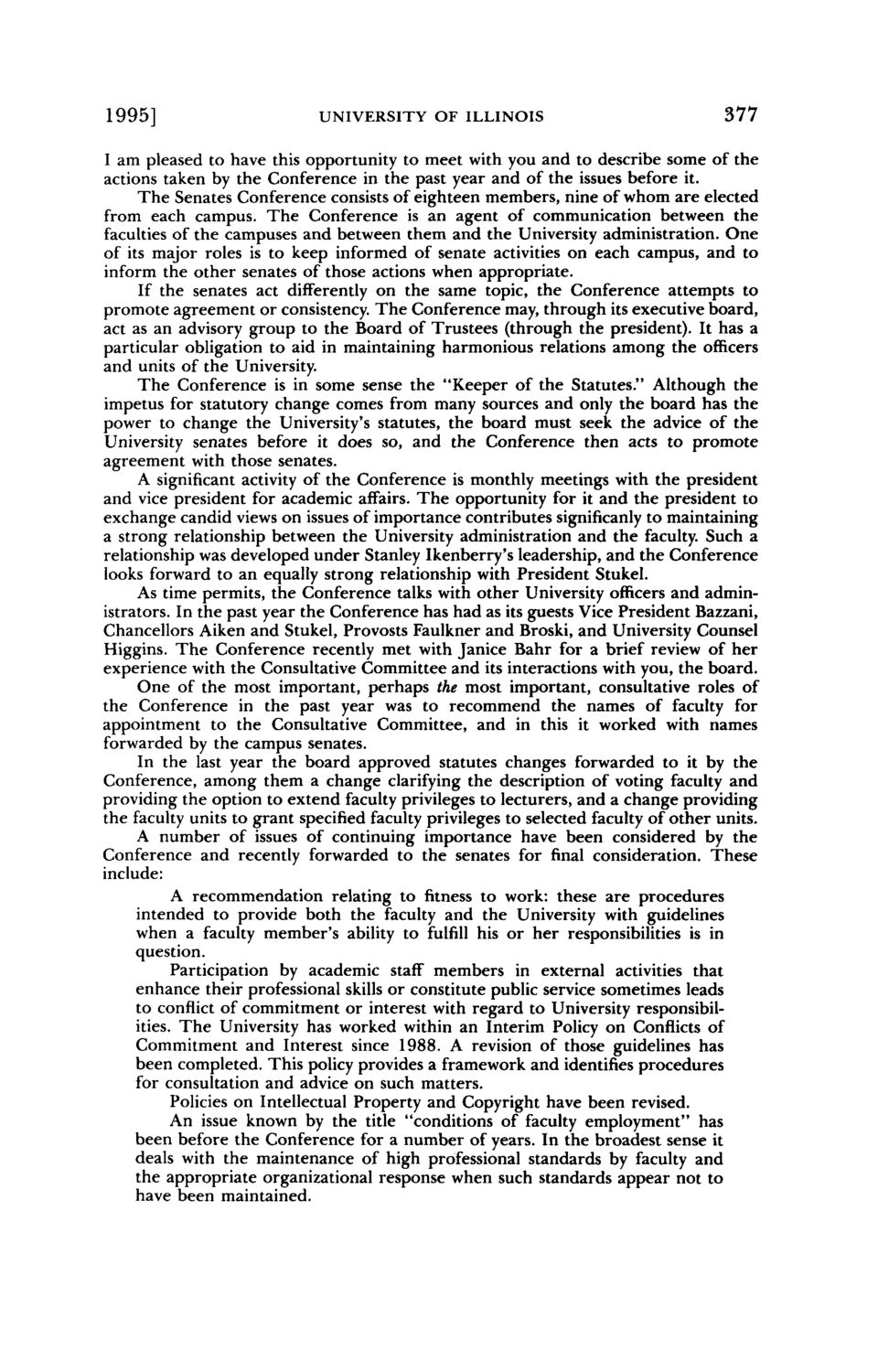| |
| |
Caption: Board of Trustees Minutes - 1994
This is a reduced-resolution page image for fast online browsing.

EXTRACTED TEXT FROM PAGE:
1995] UNIVERSITY OF ILLINOIS 377 I am pleased to have this opportunity to meet with you and to describe some of the actions taken by the Conference in the past year and of the issues before it. The Senates Conference consists of eighteen members, nine of whom are elected from each campus. The Conference is an agent of communication between the faculties of the campuses and between them and the University administration. One of its major roles is to keep informed of senate activities on each campus, and to inform the other senates of those actions when appropriate. If the senates act differently on the same topic, the Conference attempts to promote agreement or consistency. The Conference may, through its executive board, act as an advisory group to the Board of Trustees (through the president). It has a particular obligation to aid in maintaining harmonious relations among the officers and units of the University. The Conference is in some sense the "Keeper of the Statutes." Although the impetus for statutory change comes from many sources and only the board has the power to change the University's statutes, the board must seek the advice of the University senates before it does so, and the Conference then acts to promote agreement with those senates. A significant activity of the Conference is monthly meetings with the president and vice president for academic affairs. The opportunity for it and the president to exchange candid views on issues of importance contributes significanly to maintaining a strong relationship between the University administration and the faculty. Such a relationship was developed under Stanley Ikenberry's leadership, and the Conference looks forward to an equally strong relationship with President Stukel. As time permits, the Conference talks with other University officers and administrators. In the past year the Conference has had as its guests Vice President Bazzani, Chancellors Aiken and Stukel, Provosts Faulkner and Broski, and University Counsel Higgins. The Conference recently met with Janice Bahr for a brief review of her experience with the Consultative Committee and its interactions with you, the board. One of the most important, perhaps the most important, consultative roles of the Conference in the past year was to recommend the names of faculty for appointment to the Consultative Committee, and in this it worked with names forwarded by the campus senates. In the last year the board approved statutes changes forwarded to it by the Conference, among them a change clarifying the description of voting faculty and providing the option to extend faculty privileges to lecturers, and a change providing the faculty units to grant specified faculty privileges to selected faculty of other units. A number of issues of continuing importance have been considered by the Conference and recently forwarded to the senates for final consideration. These include: A recommendation relating to fitness to work: these are procedures intended to provide both the faculty and the University with guidelines when a faculty member's ability to fulfill his or her responsibilities is in question. Participation by academic staff members in external activities that enhance their professional skills or constitute public service sometimes leads to conflict of commitment or interest with regard to University responsibilities. The University has worked within an Interim Policy on Conflicts of Commitment and Interest since 1988. A revision of those guidelines has been completed. This policy provides a framework and identifies procedures for consultation and advice on such matters. Policies on Intellectual Property and Copyright have been revised. An issue known by the title "conditions of faculty employment" has been before the Conference for a number of years. In the broadest sense it deals with the maintenance of high professional standards by faculty and the appropriate organizational response when such standards appear not to have been maintained.
| |